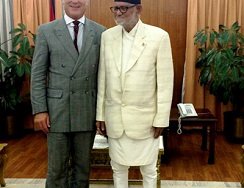
The UK Minister for International Development, Desmond Swayne TD MP has paid a two-day visit, his second visit, to Nepal. He previously visited here in February 2015.
As part of this visit, Minister Swayne examined some of DFID’s work in the area of disaster preparedness, including the Humanitarian Goods depot a at the airport and the site of emergency supplies which were placed in various locations throughout the Kathmandu Valley for use in case of an earthquake or other humanitarian crisis.
The British Minister also met Prime Minister Sushil Koirala and expressed his government's commitments to support Nepal’s reconstruction phase.
The Minister met with senior government officials of Nepal and discussed issues related to the post-earthquake reconstruction and DFID programs. The minister has made it clear that his country can continue to support the government and development of Nepal. The Minister also visited an earthquake affected area and met with the community, people from NGO’s and UN partners who have been working closely with DFID Nepal to deliver vital humanitarian assistance.
The UK aid support to Humanitarian Assistance stands at £70m. This has been used to save lives and reduce suffering caused by the recent earthquakes by giving a range of assistance such as shelter, health, sanitary products, blankets to those most affected. DFID has: i) provided direct assistance through technical expertise, good in-kind and cash, and ii) supporting the wider humanitarian response through common logistics, cluster coordination and needs assessments.
Within a day of earthquake, the UK deployed a team of 60 search and rescue workers to Nepal who were able to help recovery efforts. The UK health humanitarian response also quickly provided 4 surgeons, 29 other medical specialists and 1 logistician to provide life-saving services on the ground. Within the first couple of days, the UK supported 10 operating theatres and 400 beds which were put back into hospitals in Kathmandu.
UK preparedness support, through the pre-positioning of shelter items, other essential non-food items, meant that supplies could be given out to those who needed them within hours of the earthquake. “We supported the Red Cross to train first aid volunteers in search and rescue and these people saved the lives of many in their communities. The Humanitarian Good Depot enabled Kathmandu airport to provide an immediate, effective response.
According to a press release of British Embassy, direct impact of the UK aid will be: 200,000 people benefitting from lifesaving shelter support, 80,000 people receiving cash transfers, 35,000 people benefitting from improved water hygiene and sanitation facilities, 30,000 people receiving non-food items such as blankets and cooking kits, 15,000 women and girls benefitting from protection and gender initiatives, 5,600,000 people living in earthquake affected districts benefitting from the restoration of healthcare services in their area, 5,000 people and their care givers receiving rehabilitation and physiotherapy services as many have been injured in the earthquake and 60,000 people receiving essential health services such as immunization and care for pregnant women and those giving birth.
The UK has provided essential logistical support, including funding helicopters for airlift, loading equipment for Kathmandu’s main airport and technical expertise to assess needs and coordinate and target the international response. As an example of this, with UK funds, over 900 metric tonnes of cargo have been delivered by over 3,000 flights to the worst affected districts in Nepal.
UK aid support will continue through the monsoon and the winter to help prepare against floods or severe weather in the mountains where people have lost shelter due to the earthquake.
- TANAHU HYDROPOWER PROEJCT: A Significant Achievement
- Apr 15, 2024
- AMBASSADOR HANAN GODAR: Sharing Pain With A Nepali Family
- Mar 30, 2024
- VISIT OF KfW AND EIB TO NEPAL : Mission Matters
- Mar 25, 2024
- NEPAL BRITAIN SOCIETY: Pratima Pande's Leadership
- Mar 24, 2024
- NEPAL ARMY DAY: Time To Recall Glory
- Mar 15, 2024
















